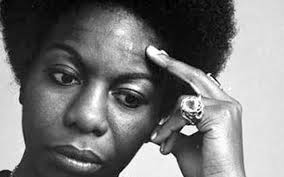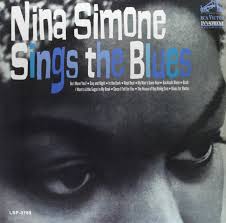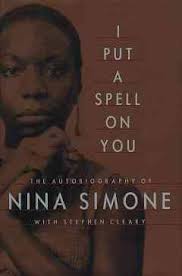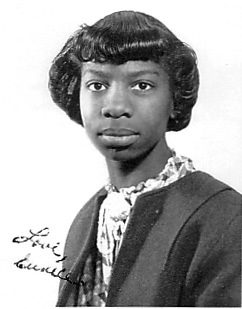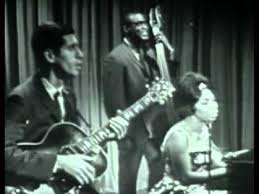Nina Simone (1992)
“I don’t think I’m difficult. Not at all.”
The prospect of interviewing Nina Simone was thrilling.
And slightly terrifying.
Nina Simone had a reputation. She was angry. Volatile. Unpredictable. Or so it was claimed by those who had roused her ire. And she admitted as much herself in her then-new autobiography, “I Put A Spell On You,” though Simone made clear the reasons for her rage, which were far from frivolous.
When the moment arrived and we were speaking via transatlantic telephone call, I found Simone wary and a bit reticent, but not harder to interview than other allegedly temperamental artists I had spoke to over the years. I was not so much intimidated by her as I was by my own admiration for her artistry and willingness to speak her mind no matter the cost.
As a teenaged music fanatic in the early 1960s, I’m sure I had heard the name Nina Simone. It’s likely I had heard her sing, too, but if so, she had made no particular impression on me. Then, one night in 1967 or 1968, I was at a party. A record played in the background, as was always the case at parties in those days. This voice cut through the chatter and laughter and made me listen. At first I thought the voice belonged to a man. I wasn’t sure, but what did gender matter? I collared our host and he handed me the album jacket: “Nina Simone Sings the Blues.” I literally couldn’t wait to buy this record. I convinced the host to loan me the album, which I took home and played obsessively.
At that point in time, Aretha Franklin was the unchallenged Queen of Soul. Nina Simone, I learned, had been dubbed the High Priestess of Soul some time before Aretha was given her royal sobriquet. Who can argue with either title?
Now, 12 years after her death in 2003 at age 70, Nina Simone is being discovered anew with not one, not two, but three movies and a worthy tribute album.
An unblinking documentary, “What Happened, Miss Simone?,” made with the help of her daughter, Lisa, had its premiere at the Sundance Film Festival and is now available on Netflix. A second documentary, “The Amazing Nina Simone,” made with the cooperation of Simone’s siblings, is due for release later this year. Also on its way is the Hollywood biopic, “Nina,” with Zoe Saldana, a much-argued casting choice, in the title role. And on July 10, 2015, RCA released “Nina Revisited: A Tribute to Nina Simone,” which does double duty as a comeback for Lauryn Hill, who sings six tracks [click on her name to see her impressive performance of Simone’s “Feeling Good” on Jimmy Fallon’s “Tonight Show.”]
Above: Simone singing “Ain’t Got No, I Got Life,” circa mid-’70s
June, 1992
By phone from her home in the Netherlands
I just finished reading your autobiography (“I Put A Spell On You”). You say at the beginning that it’s something you started working on 30 years ago. That’s a long time.
Well, we had an idea 30 years ago. It was suggested to me by my fans that I write something about my life. But we didn’t start working on the book until two years ago.
Would you say you were you working on it mentally, in your head, before then?
Well, I kept 17 diaries. We had a lot to work from when I started.
Did you let your co-writer (Stephen Cleary) use the diaries?
No, he used computer, tape recorder and pen and paper. We went to various places around the world. Montpellier [France], the U.S., Florida, California, London and Paris to write that book. We travelled to five places. It jogged my memory. At the same time, he wanted to go back to where I lived. He went back to the country seat to what made Tryon [North Carolina] tick, the place where I was born. He visited all these places. He was pretty thorough. We just didn’t include the fact that I’m a doctor twice over. I have a [honorary] degree from the University of Massachusetts in Amherst and Malcolm X College in Chicago. That’s not in the book.
You are very honest in the book about the difficult experiences you’ve had. Was it hard to talk about the painful emotional episodes in your life?
It wasn’t difficult at all. Remembering some of it was difficult, but most of it was just putting down what I had put down in my diaries all those years. Where you’re writing a book, sometimes it’s painful to remember things from your childhood and sometimes it’s pleasant. In my case, it was pleasant to remember my childhood. The most painful stuff was when I got turned down in Philadelphia for a scholarship at the Curtis Institute. And also it was painful leaving Africa [Simone lived in Liberia for two years in the mid-’70s]. Other than that, it was a whiz.
Getting turned down by Curtis [most likely because of racial prejudice] seems like it was a pivotal occurrence in your life.
Yes, it pushed me toward show business [and away from classical music]. I’ll be honest with you. Until about a year ago, I still regretted it. Then somebody here in Amsterdam gave me a recording, which I have on right now, of Africans playing classical music, with two violins, viola, cello, choir and drums. And then I didn’t look back anymore. I realized that my music is black classical music too. Do you understand? That’s what I had been saying all along, but then I got carried away. And because the people in America always say that we play only jazz because we are black, I had stopped saying that what I play is black classical music until a week ago. Then it all of a sudden all made sense what I have been playing all these years. Even though I got turned down by Curtis, it’s still playing black classical music. It’s just infused with classical training, like the Africans I have on this tape.
In the book you talk about your singing career as something almost magical– that you opened your mouth and people responded deeply to what they heard. Do you think that perhaps all your classical training somehow subconsciously prepared you to be a singer?
I was myself. But I had been influenced by playing popular music at Arlene Smith Studio [in Philadelphia]. I had been playing lots of popular music and I didn’t know that I was going to become a singer. But when I went to the first nightclub that I played in, I simply played all the songs that I’d heard these kids trying to sing at her studio. I did when I was small. But I hadn’t played by ear publicly outside of the church until I got into nightclubs. So after 20 years of training for classical music, it was an outlet. I felt let out of a cage – that I could improvise on these popular songs with the classical technique.
Did your Southern background effect you too?
Yes, I was always affected by music from the church. My mother, the hymns, from the spirituals, the gospel. I was always affected by that. And I intensely believe in God.
Would it be fair to say that your career chose you?
You better believe it did [laughs]. I was a child prodigy and I didn’t have much to do with it. I’ve been playing piano since I was three.
There’s a depth to everything that you do that seems to be missing in a lot of music today. Would you agree?
Yes, I do. I don’t like rap music very much. It’s mostly poetry with drums. I enjoy the protest lyrics because it’s a reflection of what I used to do. But I don’t enjoy them calling it rap music. The music is a mistake. It’s just poetry and drums and that’s what they should call it.
You are no longer in the spotlight in the United States, but you’re still loved by many people. Do you think that has something to do with your music being a serious thing and not frivolous?
Yes, I think so. Also because of the protest that I did over the years. The 10 years I spent with the civil rights movement stands in my stead now that I’m not in the States. And I’m sure that people will want to hear it again when I come back to Boston for a June 29, 1992 performance at Symphony Hall; guitarist Mark Whitfield and his trio was the opening act].
You were in Boston last month and performed with the Boston Pops at a Paul McCartney tribute. I didn’t get to attend unfortunately. What did you sing with the Pops?
“Let It Be” and “Long and Winding Road.” I admire [the Beatles’] songs and they were fans of mine. In fact, the middle part of “Michelle” was inspired by the way I sing “I love you.” They said that in an interview.
[Above: “Here Comes the Sun”: Not by McCartney, but you get the idea….and a beautiful lesson in how to cover a song with respect while making it your own.]
You were deeply involved in the civil rights movement. Do you think that involvement hurt your career?
Yeah, the record company punished me for 10 years. The wouldn’t send me my royalties. It was that blatant. Everybody knows about it. We’re still in the process of trying to get what I’m owed. There are 30 pirated albums in England right now. Trying to track down the pirates, you can hardly do it. They come and disappear as quickly as you find them. We have two lawyers trying to get my royalties. We’re getting some.
Do you get royalties from your albums getting reissued on CD?
I don’t get anything. Not unless the lawyers can track them down.
Would you like to make some new recordings?
Yeah, we’ll make one, though not soon. It won’t be until the end of the year. I might do it in France. But maybe in the U.S. We’ll wait and see what kind of offers I get.
In your book, you admit that you’ve been volatile at times onstage and that you’re sometimes overtaken emotionally by circumstances. Is that emotional vulnerability a price you pay for your spontaneity in performance?
We used to work that way. We don’t work that way any more. I’m calmer. I’m happier in Europe and I’ll be moving to Africa next year. [Simone did move the following year, but to the south of France.] I don’t react to audiences like I used to. We have a planned set and I do that at each concert now. They’ll be five of us. Guitar and vibes by Al Schackman, who’s been with me for 25 years. Leopoldo Fleming, who’s been with me for 20 years, plays percussion. My drummer, Paul Robinson, has been with me for four years.
You’ve worked with Al Schackman for almost all of your career. How does it work with you living in Europe?
He lives over here now. The empathy has never left. I live in Amsterdam. I’ve been here for three years. Next year I’m moving to Ghana. I’ll be there six months a year and the other six months I’ll be in Europe.
Would you ever consider living in the U.S. again?
No, darling. Especially in light of the riots which have just reoccurred. No, I don’t think so, even though I have an apartment in Hollywood.
After reading your book and then thinking about what happened in L.A., it really seems that not all that much has changed in the United States. [The L.A. riots that took place after the Rodney King verdict lasted from Aug. 29 to May 4, 1992.]
It’s the same thing as 1965.
Is this discouraging for you? Does this make it hard for you to want to perform in the U.S.?
Well, I don’t know. I really won’t know till I get there. The schedule is pretty hectic. I was a little stressed out about it, but I think it’s gonna be alright. But I won’t know until we get there.
A review of your book that appeared in a Boston newspaper – not the one I write for – that described you as a terribly difficult person. Would you agree with that?
[Laughs] No. I don’t think I’m difficult. Not at all. But I must admit that when I was in the States I was under pressure all the time. That’s not true in Europe.
Well, thank you for taking the time to talk to me today. It’s been a pleasure and an honor.
Just tell everybody I’m coming.
Above: “I Put A Spell On You.” Yes, she certainly did.
